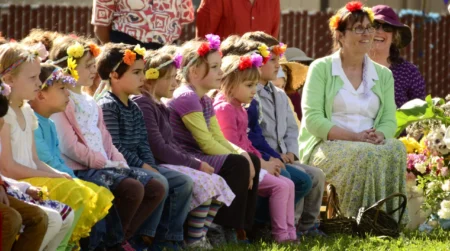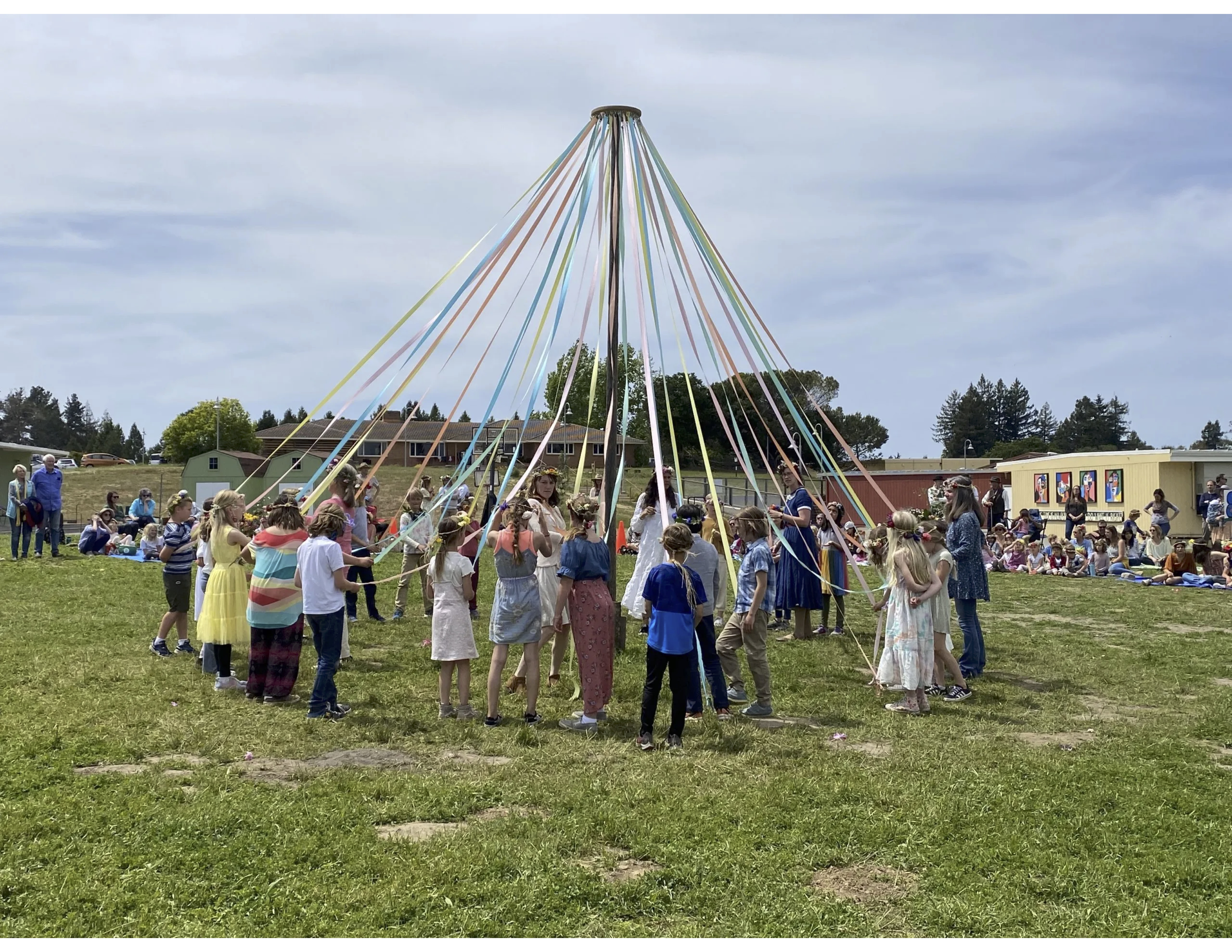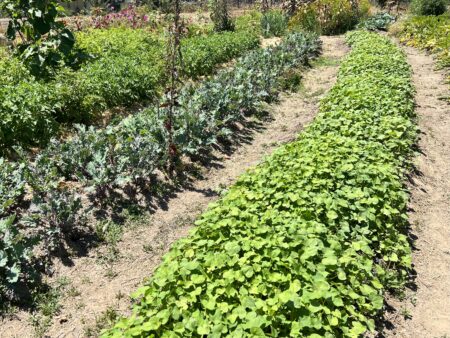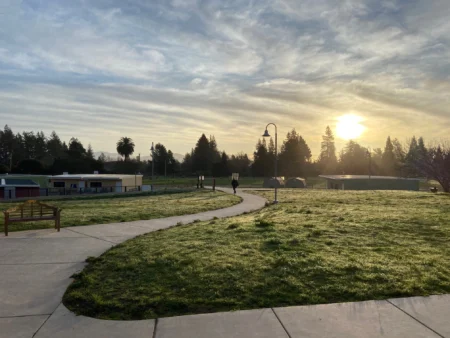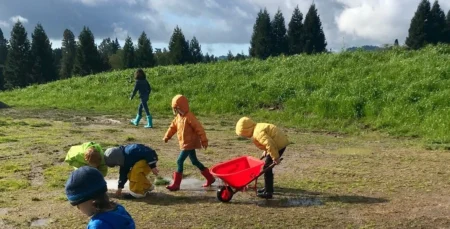Pioneering public Waldorf School nurtures community connections
Jun 24 2024
Sebastopol Charter School’s decades-long relationship with RSF enables sustainable growth and impact
Deep community integration and mutually nourishing relationships with partners have proved to be superpowers for Sebastopol Charter School. From its humble origin in a church basement in 1995, when it became one of the first charter schools in Sonoma County, the California K-8 institution has grown to serve 283 current students on a 20-acre campus and in 2016 became the nation’s first accredited public Waldorf school through the Alliance for Public Waldorf Education.
That growth was not assured. Because of its status as an independent charter school, Sebastopol Charter School is not provided facilities and is not eligible for the state funding a typical public school receives. That makes raising enough money to keep up with the cost of building and augmenting facilities an ongoing challenge, notes Essie Bishop, administrative director at the Charter Foundation, the nonprofit funding body that supports the school.
And while the school has never been in dire straits, it has relied heavily on its long-term relationship with RSF Social Finance, which provided loans for three major rounds of facilities development. Bishop says RSF’s mission alignment on social and environmental issues, deep ties to the Waldorf community, competitive rates, responsiveness, and collaborative approach have allowed Sebastopol Charter School to thrive through several growth stages.
Grounding students in positive social change, ecological impact, and community building
Sebastopol Charter School was founded to provide students with the depth, beauty, and rigor of a private school guided by the core principles of Waldorf education, but without the tuition that is a barrier for many families. This type of education orients students toward community building and working to create positive social and ecological impacts. Its curriculum—emphasizing experiential learning, land stewardship, community building, volunteerism, imagination, physical education, and the arts—resonated in this bucolic Wine Country town.
“Students’ everyday experiences foster a deep sense of responsibility toward others,” says Bishop. “They stay with the same class year after year, so they grow to trust and rely on one another. And teachers don’t shy away from challenges between children in the classroom, which teaches conflict resolution. They’re also encouraged to take on volunteer activities, so they are steeped in commitment to their community.”
The school also has a Diversity, Equity, and Inclusion Alliance run by parents, teachers, and administrators that actively works toward integrating these values into the learning environment. The DEIA aims to support the school’s community of students, families, staff, and teachers to increase self-knowledge and cultural sensitivity and to build alliances.
Students receive a particularly deep education on land stewardship and environmentalism, with a curriculum that includes regenerative agriculture principles. It’s part of students’ daily practice to compost, recycle, and use sustainable and renewable materials—a standard that applies to everything from the clothes they wear to classroom supplies, which are repurposed and reused repeatedly.
All these elements combine to create “a sustainability-forward baseline perspective on how the world works, how people care for each other, and how we care for the earth,” Bishop says.
Embracing a partnership that helps values bloom
Sebastopol Charter School’s values shine in its unique partnership with the Ceres Community Project, a nonprofit organization (and fellow RSF borrower) that uses produce grown in its organic gardens to prepare free, customized, medically tailored, home-delivered meals for people who are too sick to shop or cook for themselves. After losing its initial garden space to development, the organization reached out to Sebastopol Charter School to discuss a partnership.
That led to Ceres cultivating a 1.5-acre regenerative garden on the school’s property that is “exactly in alignment with our ideals,” Bishop says. The beds are mindfully constructed to optimize water use. The harvests benefit people in need of restorative meals. And Ceres offers volunteer programs for Sebastopol Charter middle school students that teach them about responsible horticulture. Ceres is also helping the school design a second garden solely for curriculum, parent volunteerism, and therapeutic purposes.
“It’s a wonderfully full-circle, mutually beneficial relationship,” Bishop says. “The children are all going to see their parents volunteering in our school, giving back to the community. They’ll also see that they’re already in a position to give back to the community as well.”
Relying on a two-decade lending relationship for sustainable growth
Sebastopol Charter School traveled a long road to get to this place, and more than $7.5 million in loans from RSF over two decades were essential to its progress.
A $1.65 million mortgage loan to the Charter Foundation in 2000 helped the school move out of cramped rental spaces and construct its first campus in downtown Sebastopol. The buildings housed grades three through eight, while portable buildings on a nearby district campus housed the school’s kindergarten through second-grade classes. The arrangement worked well for more than a decade, and within that time the Charter Foundation paid off its entire loan. But the school’s administrators dreamed of unifying the campus and creating communal spaces where students could gather and play instead of relying on the public park across the street.
In 2013, the Charter Foundation approached RSF again, this time for a $3.6 million loan to purchase a 20-acre property just north of the initial campus. The money covered the land purchase, classroom construction, utilities installation, and renovations to an existing house, which now serves as administrative offices. RSF continued to serve as a steady financing partner for the school through a $2 million bridge loan and several incremental increases to its earlier mortgage loans.
The last wave of funding from RSF came in 2022, when the Charter Foundation requested $220,000 to install solar panels and convert fully to renewable electricity, deepening the school’s environmental commitment and reducing its utility bills.
“The school’s long relationship with RSF has allowed it to grow at a pace that makes sense,” says Bishop. “We have a real relationship with RSF based on mutual understanding and visibility that extends beyond mission alignment and familiarity with Waldorf education values. It’s not some blind banking relationship where we’re just a number on a spreadsheet. RSF truly celebrates our accomplishments and proactively supports us by asking about our needs and what we want to achieve.”
Measuring impact over a lifetime
Bishop notes that Sebastopol Charter School is “very proud” of its status as a public charter school—open via lottery to all students, free of charge—as well as its achievements on academic success measures. Students’ test scores consistently rank above state and district averages. Graduates are regularly accepted into highly regarded private high schools and colleges. And in 2023 the school received a Green Ribbon Schools Silver award from the U.S. Department of Education for its partnership with Ceres; its commitment to composting, recycling, and teaching students to take care of our environment and the planet; and other sustainability-forward practices.
Yet the deepest impact of a primary education that teaches environmental stewardship and community building is best measured over time as students forge their own paths. Much as RSF’s longstanding lending relationship with Sebastopol Charter School has enabled it to progress in stages, the results of the school’s whole-child development approach are always unfolding.
“We’ve found great pride in being affiliated with an organization that is so socially conscious and so driven to support other organizations that are making valuable change in this world,” says Bishop of the RSF relationship. “Their help has allowed us to watch our students grow up and create innovative ways to make this world better.”
